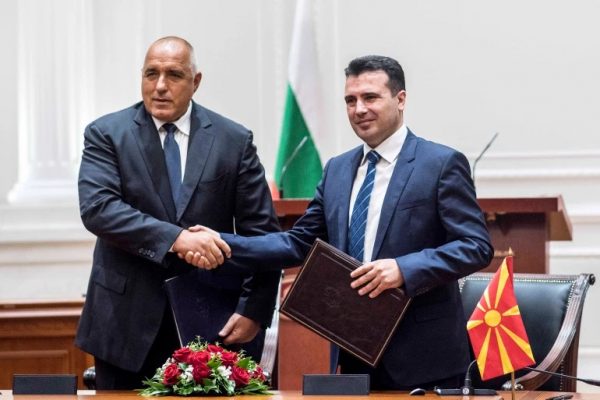by XHABIR DERALLA
When you look at public disinformation campaigns, they are often so absurd that one asks what is their purpose. With the contradictions, shallowness and vulgarity, these campaigns often evoke puzzlement, and even laughter, and also an impression that it doesn’t concern a campaign, but rather a low level of political awareness and illiteracy. A bit more literate and mindful person would disqualify them as campaigns, would reject the messages of such campaigns with indignation and contempt and would decide to ignore them. That is wrong.
The primary goal of campaigns that use fake news and disinformation is not to convince someone into something, but with continued commotion about everything, to create polarization in society and establish distrust in the institutions and political system of a country. The messages and content in the media and social networks are often incredibly stupid, though that is not important for the architects of these campaigns, as long as they are loud and present to the extent that they distort reality to such proportions that it can no longer be recognized. And ultimately, it becomes unimportant if something is a fact or it has been made up, the emotions that are evoked is what is important.
The stealing, or mildly said, copying messages of autochthonous civil movements, copying the style and vocabulary of human rights activists, are not only unethical actions and lack of knowledge and creativity. The goal is to portray everyone as the “same”, that there is no difference between the politicians and political structures. Regardless of how transparent and open a certain government or institution is, it is always questioned, viewed with distrust, and even with intolerance and hatred.
In other words, if the same amount, and even greater commotion is raised, with same or similar slogans and styles, the impression is imposed that it is about the dissatisfaction of the citizens against the same or similar structures. The crimes of some are relativized, and are attributed to others. Hence, the “little dictator” Gruevski, upon whose orders there was stealing, beating, persecuting, stealing elections and killing, is equated with the presence of Zaev. The court proceedings for unseen crimes and violence are equated with Gruevski’s regime.
(Warning: in the following text is a paraphrase of hate speech from the campaigns we are talking about in this article) “Gruevski stole, but built, while Zaev both steals and is a traitor. Gruevski was in coalition with the Shqiptars (gas chambers for them!), but knew how to control them, this Zaev guy is afraid of them and listens to them…”, and similar fabrications… “So, he’s the same or even worse” – would be the message with which reality is distorted and votes gained and also support of those in whose vocabulary there are no terms such as “democracy”, “equality”, “rule of law”, “independent institutions” …
They are not naïve strategies, although they seem grotesque, vulgar, fake and idealess. Such ways of “hybrid fighting” with disinformation campaigns in combination with the Balkan staleness and simple-mindedness are an ideal weapon against the democratic processes. Hence, it is no wonder that the European Parliament, already quite openly, recognizes the destructive consequences of the actions of political-propaganda and criminal structures in the Western Balkan states.
Better late than never, some would say, though it does seem too late. Societies in Europe, the US and other democracies in the world are deeply divided and infected with people’s distrust in the institutions and political system. And some politicians there too recognize the destructive power of disinformation and often use it in this era of “post-truth politics”, when facts are squeezed out, while emotions, usually the negative ones, are the target of political messages and actions. Constructive criticism is also used in that dirty political war “for extermination” of political opponents. Simply, everything can be used as a weapon for distorting the facts and the truth, even the very facts and truth, by distorting the contexts and replacing the theses.
The “kidnapping” or taking over of ideas and movements is an old, well- practiced skill of the Russian (Soviet) KGB, the Committee for State Security (Комитет государственной безопасности), now FSB, the Federal Security Service of the Russian Federation (Федеральная служба безопасности Российской Федерации). That is why now you see certain structures that had fought precisely against the undemocratic structures and authorities being bearers of disinformation campaigns whose actions are subtle and bring in confusion, delusions and distrust among people.
That “switch of jerseys” has at least three explanations. They have either been manipulated, or have been taken over through corruption, persuasion or pressure, or have always been part of the undemocratic structures that had only been “temporarily working” in the progressive bloc of society (sleepers).
Disinformation campaigns make people passive and reluctant, and even afraid to participate in the political and social developments and processes, such as elections or referendums. When people with democratic and progressive views are discouraged or suspicious, they remain home. Then come those who have at their disposal an obedient infantry, trained with clientelism, fear and manipulations, coming into a position to create decisions through election processes or by imposing their own agenda through the media and social networks, that is, to create an atmosphere of fear and insecurity in the country.
And they have a response to this text too, like to all previous ones. A bad, dirty, shallow response in the form of commotion, not arguments. All that is part of that multi-layered, expensively paid, usually with citizen’s money, underground action aimed against the peace and stability of democratic societies. Where does the knowledge and support come from? The answer has long been known, all that is necessary is for one to open their eyes and ears to reality, to hear a numberless times the elaborated answer:
Made in Russia (Сделано в России).
P.S. The fight continues.
translation: Natasha Cvetkovska
















